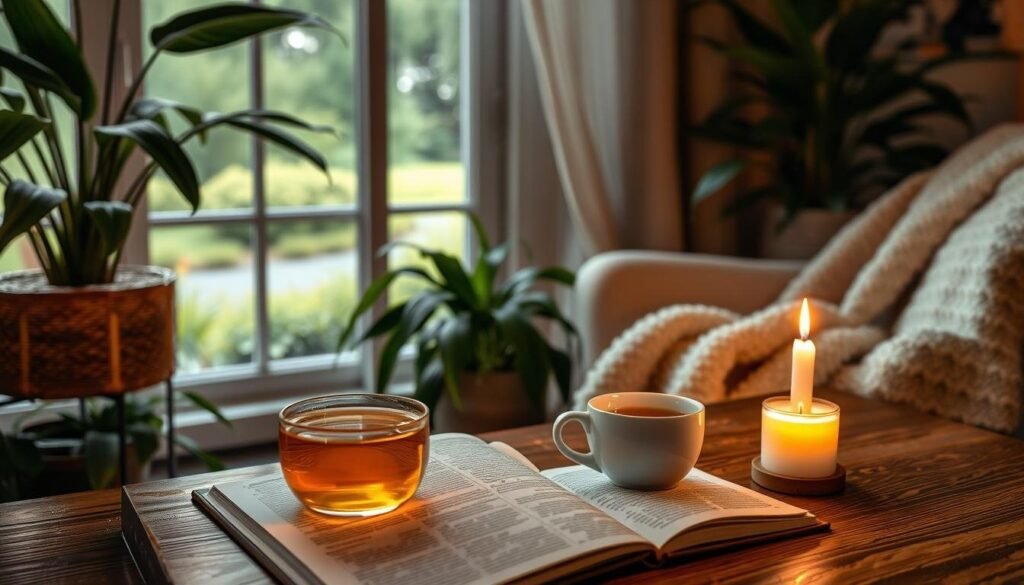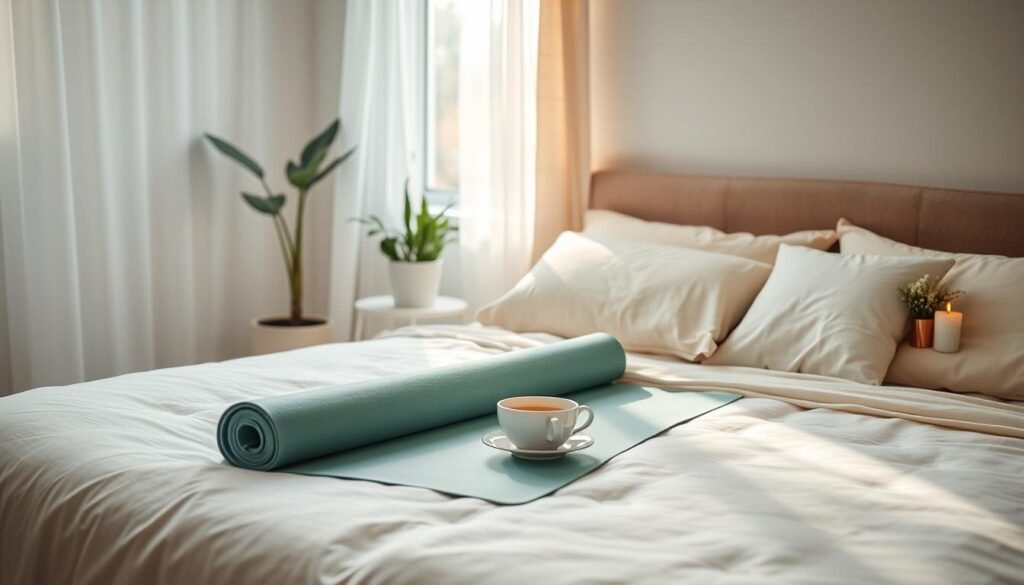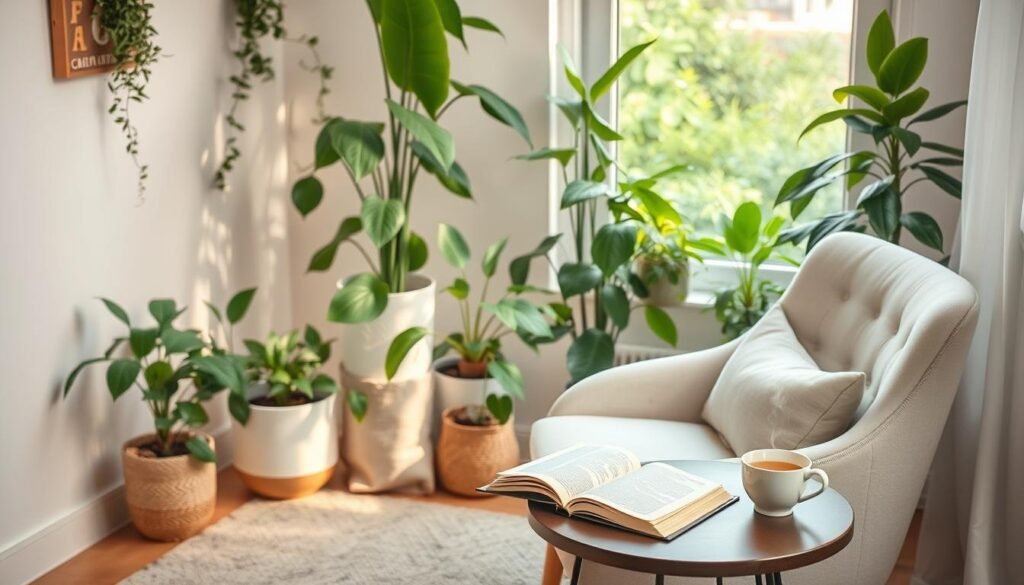Self-care is more than just a trend. It’s a key practice for our overall well-being. It helps us focus on our health, both body and mind. It includes many wellness routines that make us feel relaxed, happy, and mentally strong.
By doing self-care regularly, we can live better lives. We feel less stressed and more emotionally strong. The American Psychological Association says that taking care of ourselves is crucial for managing stress.
Key Takeaways
- Self-care is vital for physical and mental well-being.
- Incorporating wellness routines can greatly enhance life quality.
- Relaxation tips are essential for stress reduction.
- Prioritizing mental health care leads to improved happiness.
- Regular self-care practices help build emotional resilience.
Understanding the Importance of Self-Care
Self-care is about taking care of your body and mind. Doing self-care regularly brings many health benefits. It helps you find balance and recharge in tough times.
Not taking care of yourself can lead to burnout. It can also make you less productive and more stressed.

Studies show that self-care is good for your mental health. Groups like the National Institute of Mental Health say it’s key. They say we should make self-care a part of our daily lives.
This shows how important self-care is for feeling good about life. It helps us take care of our mind, body, and spirit.
| Self-Care Activities | Health Benefits | Stress Relief Potential |
|---|---|---|
| Exercise | Boosts physical health, improves mood | Reduces anxiety and tension |
| Meditation | Enhances focus, promotes emotional health | Lowers stress levels significantly |
| Journaling | Improves self-awareness, fosters clarity | Provides an outlet for emotions |
| Mindful Eating | Encourages nutritious choices, improves digestion | Reduces emotional eating |
Adding these activities to your routine can really improve your well-being. Self-care is crucial for a balanced life. It helps us take care of ourselves and feel better emotionally.
Essential Wellness Routines for Daily Life
Adding daily wellness routines to your life can greatly improve your health. These habits help you live a healthy lifestyle and take care of yourself. Simple actions like stretching, drinking water, and eating healthy can fit into any busy day.

Starting your day with a good morning routine is key. This could include:
- Morning stretches to boost flexibility and energy
- A glass of water to start hydrating
- Nutritious breakfasts like oatmeal or smoothies
Ending your day with calming evening practices is also important. Try to include:
- Quiet reading time to relax
- Short meditation sessions to lower stress
- Reflective journaling to reflect on the day
The Mayo Clinic says that regular wellness routines can cut down stress. This leads to better productivity and emotional strength. By making self-care a part of your daily life, you can live healthier and more balanced.
| Activity | Benefit | Time Needed |
|---|---|---|
| Stretching | Increases flexibility | 5-10 minutes |
| Hydration | Boosts energy levels | Ongoing |
| Nutritious breakfast | Enhances focus | 15-20 minutes |
| Meditation | Reduces anxiety | 10 minutes |
| Journaling | Improves reflection | 15 minutes |
Relaxation Tips to Incorporate into Your Routine
Adding simple relaxation techniques to your daily routine can boost your well-being. Mindfulness helps you stay in the moment, easing anxiety and stress.
Deep breathing is a great way to manage stress. Just a few minutes each day can calm your mind. The 4-7-8 breathing method is especially helpful. You breathe in for four seconds, hold for seven, and breathe out for eight.

Yoga or tai chi are also great for unwinding. They combine gentle movements with focused breathing. This mix helps relax you while improving flexibility and strength.
- Doing hobbies like painting, knitting, or gardening can be a stress-reliever. It gives you a creative outlet.
- Listening to calming music or nature sounds creates a relaxing atmosphere.
- Guided meditation for a few minutes can improve mindfulness and focus. It helps manage stress.
These tips not only reduce daily stress but also boost your mental and physical health. Studies show that regular mindfulness can lower heart rates and improve mood.
Self Care: Developing a Personalized Strategy
Creating a self-care plan that fits you means understanding your needs. It’s important to know what stresses you out and what you enjoy. This way, you can make a self-care plan that changes as your life does.
Identifying Individual Needs
To make a good self-care plan, you need to know what you need. Here are ways to figure that out:
- Journaling about what stresses you and how you feel.
- Reflecting on what makes you happy and relaxed.
- Gathering feedback from friends and family about what they see.
- Using self-assessment tools in wellness apps to find key areas to focus on.
Creating a Flexible Self-Care Plan
Once you know what you need, it’s time to make a self-care plan. Here are some ways to do it:
- Scheduling time for self-care, so you can change it if needed.
- Using mobile apps to track your progress, set reminders, and find motivation.
- Talking to health coaches for advice on keeping up with self-care.
Mindfulness Practices for Mental Health
Practicing mindfulness can greatly improve your emotional health. It’s something everyone can do, whether through meditation or journaling. These activities help keep your mind balanced and make it easier to handle daily stress.
Meditation Techniques for Beginners
Meditation is a great way for beginners to start with mindfulness. Simple methods can have a big impact on your mental health. Here are some techniques for beginners:
- Guided Meditations: Apps and online videos can guide you, making it easier to begin.
- Breathing Exercises: Focusing on your breath helps keep your mind focused and lowers anxiety.
- Body Scan: This involves paying attention to each part of your body, helping you relax and become more aware.
Journaling as a Tool for Reflection
Journaling for mental health is also very helpful. Writing down your thoughts and feelings can help you understand yourself better. Some benefits include:
- Clarifying Thoughts: Journaling regularly helps you express your emotions and clear your mind.
- Identifying Patterns: By tracking your feelings, you can find out what triggers them and learn how to cope.
- Boosting Mood: Writing about the good things in your life can make you feel happier.
| Mindfulness Practice | Benefits | Ideal for Beginners |
|---|---|---|
| Meditation | Reduces anxiety and stress | Yes |
| Journaling | Enhances emotional clarity | Yes |
| Breathing Exercises | Improves focus and calmness | Yes |
Healthy Habits to Boost Emotional Well-Being
Emotional health is key to feeling good mentally. Regular exercise is a big help. It makes your body strong and lifts your mood. Activities like walking, swimming, or yoga release happy hormones.
Eating right is also vital. Foods full of omega-3s, antioxidants, and vitamins help your brain. Adding whole grains, nuts, fruits, and veggies to your diet can make you feel better and more energetic.
Getting enough sleep is crucial too. It helps you manage your emotions and think clearly. Lack of sleep can make you feel grumpy and stressed. A calming bedtime routine can help you sleep better.
Being around people you care about is important. Spending time with loved ones creates a support network. Even small gestures like calling or texting a friend can make a big difference.
Being thankful is another good habit. Taking time each day to think about the good things in your life can change your outlook. Writing down things you’re grateful for can help you appreciate even the smallest joys.
| Healthy Habit | Benefits | Tips for Implementation |
|---|---|---|
| Regular Exercise | Improves mood, reduces stress | Set a weekly schedule, find a workout buddy |
| Balanced Nutrition | Boosts energy and mood | Plan meals, keep healthy snacks on hand |
| Adequate Sleep | Enhances emotional regulation | Establish a sleep schedule, create a restful environment |
| Social Connections | Provides support and reduces isolation | Schedule regular catch-ups, join community groups |
| Gratitude Practice | Shifts focus to positivity | Maintain a gratitude journal, share gratitude with others |
Exploring Different Self-Care Ideas
Self-care is key for keeping our bodies and minds healthy. There are many creative ways to take care of yourself. This part talks about fun physical activities and tasty foods that help us feel our best.
Physical Activities that Revitalize
Doing physical activities every day is important for our health. Outdoor exercises like hiking or cycling let us enjoy nature and get fit. Playing sports with others is a great way to stay active and meet new people. Here are some fun activities:
- Yoga in the park
- Group jogging sessions
- Dance classes
- Outdoor sports leagues
Nourishing Foods for Happiness
What we eat affects how we feel. Eating healthy foods makes us happier and more stable. Studies show that eating a balanced diet with lots of fruits, veggies, and whole grains is good for our minds. Try adding these foods to your meals:
- Leafy greens (spinach, kale)
- Fruits (berries, bananas)
- Nuts and seeds (almonds, chia seeds)
- Whole grains (quinoa, brown rice)
Creating a Relaxation Space at Home
Designing a home relaxation space is key to a mindful environment. It helps reduce stress and offers a break from daily life. A well-thought-out relaxation area can clear your mind and improve your mood.
To make a great home relaxation space, try these tips:
- Declutter the area to feel calm. A clean space has fewer distractions and feels welcoming.
- Add plants for a natural feel. They improve air quality and look calming.
- Use soothing colors like blues or greens. These colors make you feel calm and peaceful.
- Choose comfort-oriented furniture like soft chairs. It helps you relax for longer.
Interior design experts say personal touches are important. Adding elements that show your style makes the space more welcoming. This shows how important self-care is.
| Element | Impact on Relaxation |
|---|---|
| Plants | Enhance mood and air quality |
| Color Scheme | Influences emotions and calmness |
| Lighting | Creates a warm and inviting atmosphere |
| Textures | Promotes comfort and relaxation |
Creating a home relaxation space that fits your needs is crucial. It helps you stay mindful and reduces stress. Spending time on this space can greatly benefit your mental and emotional health.
Balancing Self-Care with Daily Responsibilities
Adding self-care to our daily lives can be tough, especially with work and family. Finding a good balance needs effort and smart time use. Making self-care a priority can boost our well-being, productivity, and happiness.
Creating clear boundaries is key to good self-care. We should pick times just for ourselves, like reading or yoga. This “me time” helps us relax in our busy lives.
Good time management helps make space for self-care. Here are some tips:
- Use planners or digital calendars for work and self-care.
- Sort tasks daily, focusing on urgent ones first.
- Set goals that are doable, so you have time to rest.
- Say no to things that get in the way of your self-care plan.
By doing this, we work better and take care of our minds. Experts say it’s crucial. One expert notes,
“Taking the time for self-care is not a luxury; it’s a necessity that improves both personal and professional life.”
Being proactive helps find a balance between duties and self-care. This journey makes our lives healthier and more rewarding.
| Self-Care Activity | Duration | Benefits |
|---|---|---|
| Meditation | 10-20 minutes | Reduces stress and enhances focus |
| Exercise | 30 minutes | Boosts mood and energy levels |
| Reading | 30 minutes | Improves relaxation and reduces mental fatigue |
| Creative hobbies | 1 hour | Encourages self-expression and relieves stress |
Strategies for Building Consistent Healthy Habits
Creating healthy habits is key for better well-being. It turns small daily actions into lasting behaviors. Start with simple methods like habit stacking, where you add new habits to old ones.
Behavioral science says to make changes slowly. Don’t try to change everything at once. Small steps lead to big changes in self-care. For example, set times for meals or plan exercise in your calendar.
Having someone to hold you accountable helps a lot. A friend or family member can motivate and support you. Keeping a journal of your progress helps you see how far you’ve come.
“The key to successful habit formation lies in the commitment to everyday practice and reflection.”
Here are some tips for making lifestyle changes:
- Set clear, achievable goals to maintain focus and measure progress.
- Use reminders and cues in your environment to make healthy choices.
- Celebrate small wins to keep a positive mindset.
- Regularly check and adjust your goals to keep them motivating.
By using these strategies, you can improve your wellness slowly but surely. Every small change adds up to a healthier lifestyle. It shows that steady effort is more important than being perfect right away.
| Strategy | Description | Impact on Habits |
|---|---|---|
| Habit Stacking | Linking new habits to existing routines. | Facilitates smoother transitions and retention. |
| Accountability Partners | Working with someone to share progress. | Increases motivation and adherence. |
| Small Changes | Making incremental adjustments rather than drastic shifts. | Reduces overwhelm and enhances commitment. |
| Journaling | Tracking goals and reflecting on changes. | Improves self-awareness and reinforces progress. |
Conclusion
Self-care is key to feeling better overall. It includes many activities, like exercise and mindfulness, that help us relax and be happy. These habits should be part of our daily lives to keep us healthy.
It’s not just about knowing what self-care is; it’s about doing it. We should make self-care plans that fit our lives. This means trying different self-care activities to find what works best for us.
Having a supportive community and resources is crucial for self-care. Being around people who care and using helpful tools can make a big difference. With effort and a willingness to try new things, we can all lead happier, healthier lives.
FAQ
What are some simple self-care practices I can start with?
Simple self-care includes taking short walks and doing deep breathing exercises. Drinking water and finding time for hobbies are also good. These activities help your body and mind.
How can I incorporate relaxation tips into my busy schedule?
To relax, set reminders for short breaks. Try deep breathing or mindfulness. Choose activities like yoga or reading, even for a few minutes.
Why is self-care important for mental health?
Self-care is key for mental health. It reduces stress and prevents burnout. It also boosts emotional well-being. Self-care helps you handle life’s challenges better.
What are some healthy habits to support emotional well-being?
Healthy habits include regular exercise and balanced eating. Getting enough sleep and staying connected with others are also important. Practicing gratitude and mindfulness helps too.
How can I create a personal relaxation space at home?
Create a relaxing space by decluttering and adding plants or calming colors. Choose comfy furniture. Soft lighting and soothing scents can make it even more relaxing.
What strategies can help balance self-care with daily responsibilities?
Balance self-care with daily tasks by scheduling ‘me time’. Set boundaries to protect your downtime. Ask for help from family or friends. Prioritize tasks to manage your time well.
How do I develop a personalized self-care strategy?
Start by figuring out what you need and what stresses you. Make a plan that includes things you like. Keep revisiting and adjusting it as needed.
What are some mindfulness practices I can try for mental health improvement?
Try meditation, yoga, guided imagery, and journaling for mental health. These practices increase awareness and help manage emotions.
